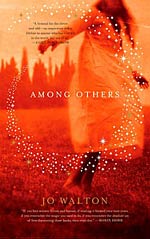
![]() ahmmel
ahmmel
2/5/2013
![]()
My February WOGF entry is Among Others by Jo Walton. This is a very strong work of adolescent fantasy with really smart treatments of magic and growing up.
The interesting thing about the plot is that the magic in the book is mostly a red herring. It's certainly a big part of Mori's life, it's not at the centre of the novel. This is mostly a book about an adolescent girl coming to terms with a difficult childhood and learning to take on adult responsibilities (a familiar enough sort of story). It's just that in this particular case, those responsibilities include performing magic on behalf of fairies which only she can see. This trick of making the magical elements of the story prominent but not central is great for realism, but some of the magical plot elements don't wrap up in a satisfying way. For me, that's the biggest disappointment in the book. All the essential elements to wrap up the main magical conflict are there, but some threads are left hanging and there was nothing much to surprise me.
On the other hand, the adolescent coming-of-age plot was one of the better ones I've read. Again, not too many surprises with the plot here, but it's quite a clever book when it comes to dealing with teenaged inexperience and confusion, with the adult world, and especially with sex. It's quite refreshing to read an adolescent fantasy that deals with the topic head-on and in an intelligent way, rather than disguising it as desire for Turkish delight or something.
Jo Walton has a real talent for characterization. I was impressed by the way she managed to paint detailed portraits of many of the minor characters in only a few paragraphs. The reader gets a very vivid impression of Sam in particular, even though he's only on a few pages. Mori's mother is very rarely directly described, hearing about her actions is still chilling.
Mori is a fairly standard adolescent fantasy protagonist in that she's an isolated teenaged girl at a boarding school with magical responsibilities. She's a bit more interesting that some of her genre-peers in that she's aware of that her diary could be an angsty read and takes steps to avoid it. Mori isn't an introvert: just a bit isolated by a bad leg, her social class and an unfashionable Welsh accent. Refreshingly, she takes active steps to stop being isolated and has a fair amount of success with it. It's nice to see a bookish character who actively seeks the company of others.
Which leads me to the much-discussed "gimmick": Mori is a big fan of SF/F novels. This makes Mori a bit of a mouthpiece for the author's opinions about the genre (which I didn't mind much, since I enjoyed reading about her opinions), but it's also a way to heighten the sense of realism. It's a bit annoying in other books in this genre when people are presented with incontrovertible evidence that magic exists and they don't try to relate it to what they know about magic from reading about it in books. Neither Harry Potter nor any of his Muggle-born friends seem ever to have read a fantasy book: it doesn't occur to them to compare the way magic actually works to the way it works in fiction. It was great fun in Among Others to read about the characters working out how magic works the way I would if I found out it exists: by comparing it to the way magic works in The Lord of the Rings or the Earthsea books.
Of course, the characters can't say "yes, it's exactly like in The Lord of the Rings", so Walton has to come up with a system of magic that's not quite like any in the books discussed. She does a pretty good job: magic works by subtly altering the world in the retroactively in such a way that the desired result comes about more or less naturally. I don't recall this mechanic in anything I've read before, and we get a very smart exploration of its implications. Mori is well aware that she can never be sure how far-reaching the effects of her magic are, and she feels considerable guilt over it. Another interesting bit was Mori's thoughts about what the existence of magic means for religion. I won't repeat the discussion here, but I thought it was really clever to include. It was new for me to read a fantasy novel where the religion isn't either fictional (Tolkein), entirely absent (Rowling), or only there in allegorical form (Lewis). It was great fun to hear about what real, demonstrable magic would mean to a religious person (who isn't inclined to do the mediæval thing and attribute it to Satan).
The plot lets the novel down a bit towards the end, but this is a really well-characterized, smart book well worth its Hugo.
Cross-posted on Goodreads.
http://www.goodreads.com/review/show/521588327